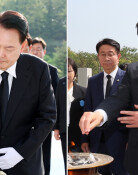U.S. worries about S. Korea taking bold approach to N. Korea
U.S. worries about S. Korea taking bold approach to N. Korea
Posted June. 22, 2017 07:16,
Updated June. 22, 2017 07:22
South Korean President Moon Jae-in has presented his second-phase roadmap to North Korea’s nuclear program in his interviews with CBS and the Washington Post before his first summit with U.S. President Donald Trump on June 20 – 30. Moon has pledged to achieve full dismantling of North Korea’s nuclear program through a dialogue with the isolated regime if Pyongyang agrees to stop its provocations on nuclear and missile fronts. His goal hints at a totally different framework to the existing strategies requiring North Korea’s genuine attitude to denuclearization before any dialogue to occur.
In an interview with the Washington Post, Moon clearly denied engaging in a dialogue with North Korea unconditionally, saying, “We do not need talk for talk’s sake.” Moon’s vision to borrow sanctions and pressure in coordination with the U.S. and the international community is in line with Trump’s administration’s position. Regarding deployment of the Terminal High Altitude Area Defense (THAAD) system, he said, “I will not willingly tp accept the previous administration’s decision on THAAD.” His comments on death of Otto F. Warmbier were satisfactory to highlight the significance of human right, which is one of the most sensitive topics to North Korea.
However, it remains uncertain if South Korea and the U.S. can find a common ground during the summit, while the U.S. is taking a hardline approach in dealing with the reclusive regime after the death of Warmbier. Moreover, Trump has even suggested the possibility that the U.S. is able to seek out a solution alone and ignore China, which has been considered as a key player in sanctioning North Korea, when he said Tuesday, “While I greatly appreciate the efforts of President Xi and China to help with North Korea, it has not worked out.” In addition, a White House spokesperson even said the White House is “moving further away” from direct engagement with North Korean leader Kim Jong Un, signaling that Trump has ruled out a diplomatic option to have a summit with Pyongyang. Against the backdrop of Trump’s shift on North Korea, Moon’s emphasis on dialogue over pressure toward North Korea will create cacophony during the summit. Moreover, though Moon said that the inter-Korean industrial complex in Kaesong will open again only if North Korea comes to the table to talk about denuclearization, his suggestion on reopening of the Kaesong industrial complex at the expense of a violation of the United Nations’ sanction draws a stark contrast to the international community’s position.
Patrick Cronin, senior advisor and senior director of the Asia-Pacific Security Program at the Center for a New American Security, who met with South Korea’s presidential special advisor for unification, diplomatic and security affairs Moon Jung-in in the U.S., said, “People in Washington are not a fool,” explaining the atmosphere in Washington that people think that Moon Jung-in, who had mentioned a phased-reduction in joint military drills and strategic assets, was speaking for President Moon. Cronin said high-ranking officials at the Department of State worried about unexpected events in October. In other words, they worry about a large-scale proposal or message to North Korea by President Moon around October 4 to celebrate the 10th anniversary of inter-Korean talks.
President Moon has completed his staff members for diplomacy and national security. However, people calling for autonomy, who created conflicts against people supporting alliance under President Roh Moo-hyun’s administration, have assumed central roles. Autonomy will only be realized when security to protect oneself is fully achieved. Moon, awaiting his first presidential summit in the U.S., must be aware of this fact.







